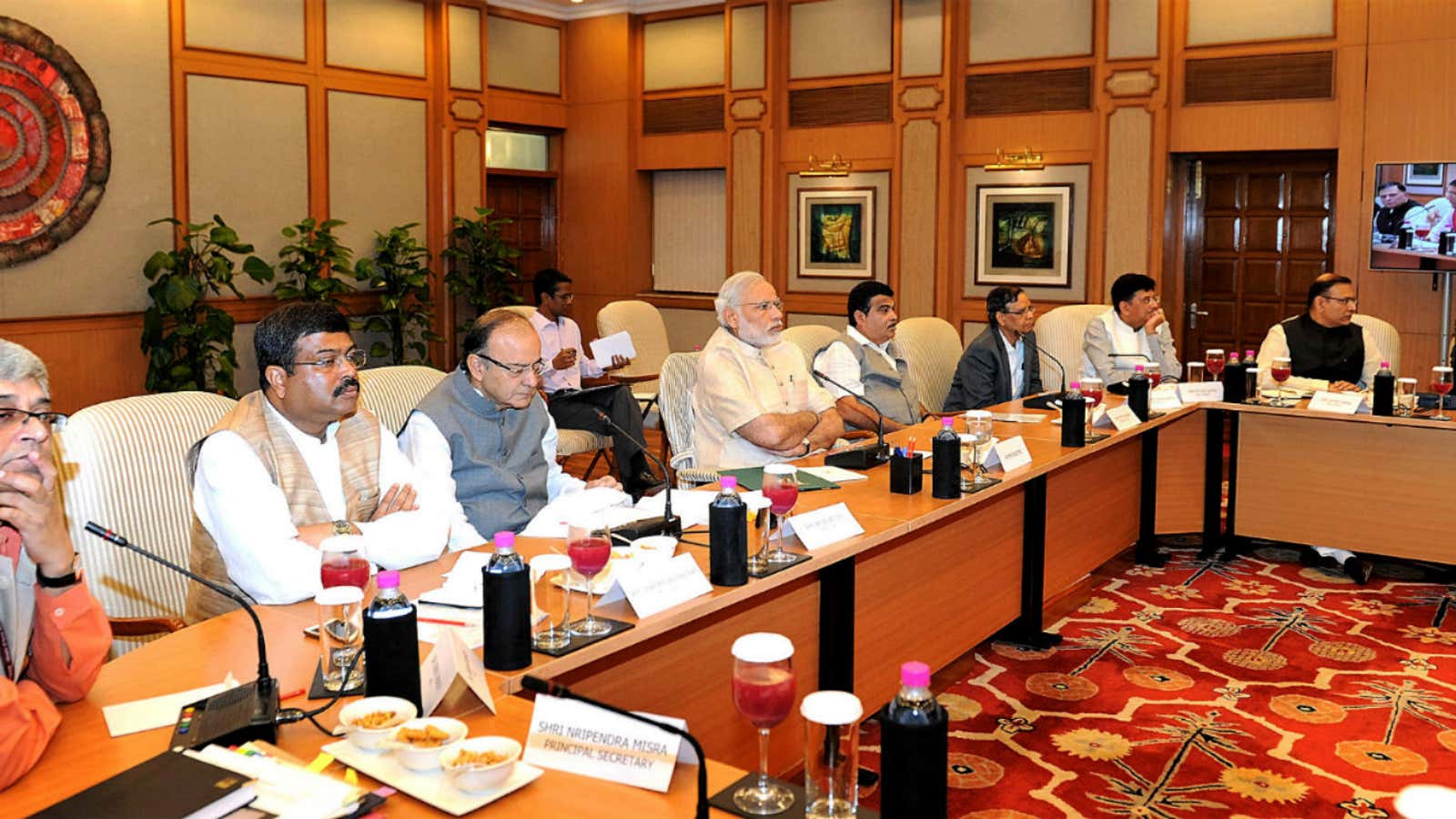New Delhi’s No. 7 Race Course Road—Indian prime minister Narendra Modi’s official residence—today (Sept. 08) hosted some of the country’s most high-profile bankers, industrialists and policy makers.
Modi spent about three hours with the 40-member group, packed with cabinet ministers, key bureaucrats and bankers, corporate leaders and economists. Reserve Bank of India (RBI) governor Raghuram Rajan, Reliance Industries’ chairman Mukesh Ambani, Tata Group chairman Cyrus Mistry and State Bank of India chief Arundhati Bhattacharya were in attendance, the Economic Times newspaper reported.
The agenda was to discuss the impact of “recent economic events and how best India can take advantage of them,” the prime minister’s office said in a statement.
Indian markets have been rattled by the recent stock market crash in China and the yuan’s biggest devaluation in two decades. A slowing Chinese economy would have repercussions in India, which does over $70.25 billion of bilateral trade with its northern neighbour.
But some argue that India could gain from the crisis. Earlier in August, finance minister Arun Jaitley said in an interview to the BBC that he saw it “as a great opportunity. The Chinese ‘normal’ has now changed.”
In a press conference after the meeting, Jaitley told reporters that the gathering analysed recent global events and their impact on India. In all, about 27 participants spoke.
“By and large, a major crux of the entire discussion was that in terms of its economy, India is relatively untouched,” Jaitley said. ”The ease of doing business, cost of labour and capital, stalled projects were among important issued raised by participants at the meeting.”
Here are the key points discussed in the meeting:
Private investments
The prime minister asked the private sector to increase its investment in India, given that it has a high risk-taking capacity, Jaitley told reporters.
“While the government has a role to play, industry also has a role to play in demand creation for investments,” Modi reportedly said.
Modi’s call comes at a time when foreign direct inflows are increasing, but domestic investments still remain subdued. In August, credit rating agency CRISIL said that an analysis of 22 sectors shows that domestic investments continue to drop. The current fiscal would see a 2% decline in investments, it added.
“The PM was emphatic that risk-related entrepreneurship should not be subdued, but catalysed. A lot of new investments could be made in soft infrastructure like affordable housing, hospitals as well as hard infrastructure like roads and highways,” said YES Bank CEO Rana Kapoor.
Monetary policy easing
The Associated Chambers of Commerce of India (Assocham)—which represents some 450,000 business entities—called for a cut in interest rates, Reuters reported.
Many other participants also asked for monetary easing, Jaitley said.
“Prime minister said this is an opportunity for us to take advantage and invest… cost of capital is too high but I don’t know how many people can go ahead to take risk and invest… many of us raised the issue of interest rate,” Jyotsna Suri, president of the Federation of Indian Chambers of Commerce and Industry, said.
The RBI will announce the next monetary policy review on Sept. 27, with the government seemingly exerting pressure on the central bank to cut key interest rates.
Economic reforms
The meeting also included discussions on improving the ease of doing business in India and specific industry-related issues, Sumit Mazumdar, president of the Confederation of Indian Industries (CII), told CNBC TV-18.
“The prime minister and the finance minister virtually advised secretaries and top officials to work towards improvements in the areas of concern flagged by each industrialist. The government has signalled the strong will to improve the regulatory landscape so that there’s a genuine rebound in investments and the economy,” YES Bank’s Kapoor said.
“None of the legislative issues were discussed except some discussion on the goods and services tax (GST),” CII’s Mazumdar added. There were no reports of the controversial but critical land acquisition bill being discussed at the meeting. Meanwhile, Jaitley said that the long-impending bankruptcy bill is in the final stages of drafting.
The industry participants also discussed the need to revive India’s agriculture sector. Below normal rainfall is threatening agricultural production in the country, which in turn could hamper rural demand and limit wage growth in these areas.
“India Inc. suggested that focus on agri (agriculture) productivity must be increased,” Jaitley told reporters.
